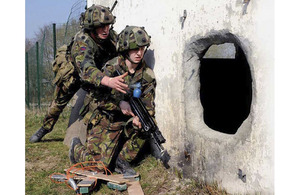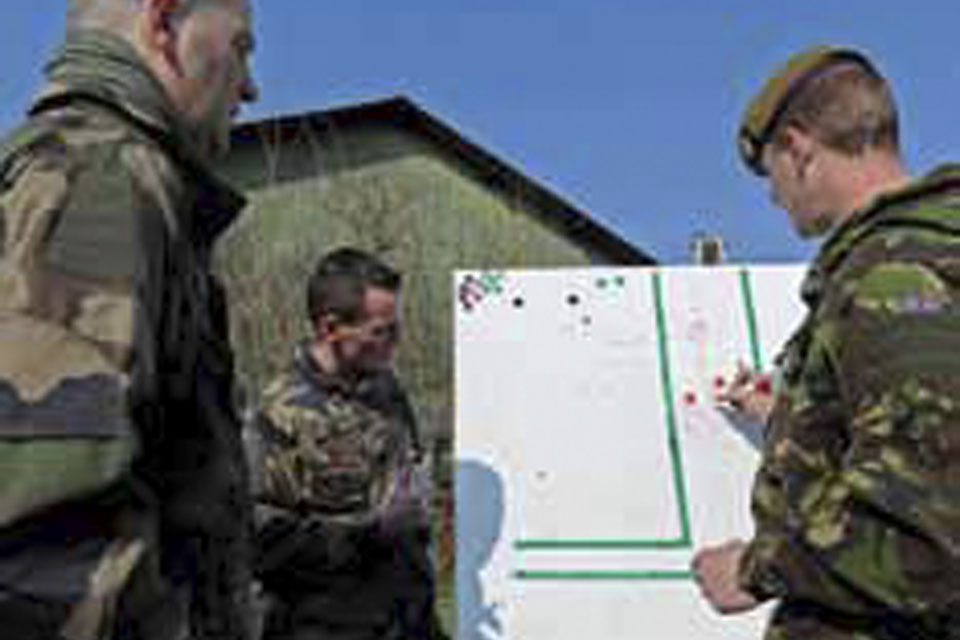UK and French troops train together
To increase interoperability between French and UK troops, reciprocal training has begun between the two nations.

To increase interoperability, British soldiers train with their French counterparts [Picture: Staff Sergeant Ian Houlding RLC, Crown Copyright/MOD 2011]
Nestled in the northern French countryside is CENZUB, one of the French Army’s training camps which specialises in fighting in a built-up area (FIBUA) and comes complete with tailor-made mock-residential areas to provide as realistic an experience as possible.
The camp, on the outskirts of Sissonne, played host to 106 soldiers from No 1 Company of the Coldstream Guards in March 2011, as the British troops made history by becoming the first to train with the French Army since the defence co-operation treaty between the two nations was announced in November 2010.
Exercise Gaulish saw the Coldstream Guards undertake two weeks of intensive training which encompassed counter-IED skills as well as offensive and defensive missions, and took place in the camp’s two purpose-built training residential areas.
Beausejour, the smaller of the residential areas, comprises three roads and several small houses, whereas the larger - Jeoffrecourt - has been developed to imitate a much bigger city and features a river as well as different districts.
As well as the life-like towns, CENZUB boasts Municourt - an area used specifically for counter-IED training. In addition, there is another area for crowd control training and an urban firing range which is currently undergoing an experimental phase before being used as a full training area.
During the First World War, the camp housed 50,000 French military personnel and morphed into a training facility in 2004 to encourage visits from foreign troops, with the aim of sharing experiences.
Since the defence co-operation announcement last year, the Guardsmen are the first UK troops to capitalise on the partnership by sharing knowledge in a bid to increase interoperability, and, according to CENZUB’s Colonel Legrand, the Coldstream Guards are extremely welcome:
I am very pleased to welcome the British troops here,” he said. “What is very interesting is that we can share interoperability, although between the two cultures there are often limitations so it’s interesting to discover what those limits are.
I told the French and British company commanders when they arrived that they should share what they can. The French unit here should be committed to Afghanistan within the next year, and so they are very interested in the experience of the British unit in Afghanistan.
The first part of the two-week training programme saw the British troops undergoing lessons with French Army instructors who outlined their approach to FIBUA. To overcome language differences, an English-speaking French instructor interpreted during the lessons.
During the second week of the training, the soldiers took to Jeoffrecourt to carry out a full field training exercise and implement the French instructions they had learned during the previous days.
The language barrier wasn’t the only obstacle the troops had to negotiate, with differing Tactics, Techniques and Procedures (TTPs) also proving challenging.
Colonel Legrand said:
Around 75 per cent of our TTPs are the same, which is quite logical. 25 per cent are different and that is the most interesting thing for us, being able to share experiences to develop more interoperability; it means that we will be ready to work together and be ready to use British support for French units or French support for British units.
We’re impressed with the aggressiveness of the British troops. One of our goals is to develop aggressiveness with our French soldiers, so it is good to see the British doing it.

French Army instructors conducting lessons with British soldiers [Picture: Staff Sergeant Ian Houlding RLC, Crown Copyright/MOD 2011]
But, what was the experience really like for the soldiers taking part?
Lance Corporal Andrew Ryder, No 1 Company, Coldstream Guards, said:
It’s been quite hard learning their skills, because although they’re similar to ours, they are different in some ways. We’re just trying to put their skills into practice and not do the ones that have been drilled into us.
Guardsman Nathan Idonga, Coldstream Guards, said:
There are slight differences. Us soldiers, we always believe in what we do and we always believe that what we’re doing is right. The French Army has their methods of doing things but the objective is the same, so if it works for them that’s good. Fair play to them.
I actually expected more of a difference between the two ways of working than I’ve found.
The focus on improving interoperability between the two nations seemed to reign supreme in the list of priorities for both countries.
Major Oliver Biggs, Commander of No 1 Company, Coldstream Guards, said:
We’re in France, we’re using French weapons, we’re being taught by French instructors and working alongside French troops gives us an international aspect.
We’ve got the opportunity to practise in a new training environment, so there’s the novelty factor and there’s nothing quite like this in the UK.
It also offers something that we’re keen to develop, which is a step away from Afghan specific training; we’re not in mission specific training for Afghanistan, so it gives us a chance to broaden our perspective on the character of conflict, particularly in an urban environment.
As part of the co-operation agreement last year, this relationship between the French and British Armies is a reciprocal one, so we should very soon be welcoming troops from France into one of our own training establishments. Let’s hope we can impress them as much as it seems they’ve impressed us.